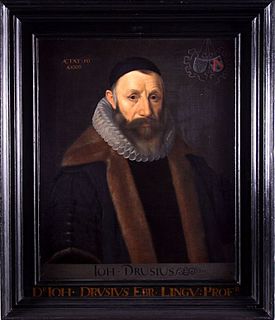
A vernacular, or vernacular language, is the lect used in everyday life by the common people of a specific population. It is distinguished from national, literary, liturgical or scientific idiom, or a lingua franca, used to facilitate communication across a large area. It is usually native, mostly spoken informally rather than written and usually seen as of lower status than more codified forms. It can be a distinct stylistic register, regional dialect, sociolect or an independent language.

William Robertson Smith was a Scottish orientalist, Old Testament scholar, professor of divinity, and minister of the Free Church of Scotland. He was an editor of the Encyclopædia Britannica and contributor to the Encyclopaedia Biblica. He is also known for his book Religion of the Semites, which is considered a foundational text in the comparative study of religion.
Georg Wilhelm Friedrich Freytag was a German philologist.

Samuel Rolles Driver, FBA was an English divine and Hebrew scholar. He devoted his life to the study, both textual and critical, of the Old Testament. He was the father of Sir Godfrey Rolles Driver, also a distinguished Bible scholar.

Hiob or Job Ludolf, also known as Job Leutholf, was a German orientalist, born at Erfurt. Edward Ullendorff rates Ludolf as having "the most illustrious name in Ethiopic scholarship".

Thomas Adams (1583–1653) was an English clergyman and reputed preacher. He was called "The Shakespeare of the Puritans" by Robert Southey; while he was a Calvinist in theology, he is not, however, accurately described as a Puritan. He was for a time at Willington, Bedfordshire, and his works may later have been read by John Bunyan.

Johannes van den Driesche [or Drusius] was a Flemish Protestant divine, distinguished specially as an Orientalist, Christian Hebraist and exegete.

Jacob Golius born Jacob van Gool was an Orientalist and mathematician based at the University of Leiden in Netherlands. He is primarily remembered as an Orientalist. He published Arabic texts in Arabic at Leiden, and did Arabic-to-Latin translations. His best-known work is an Arabic-to-Latin dictionary, Lexicon Arabico-Latinum (1653), which he sourced for the most part from the Sihah dictionary of Al-Jauhari and the Qamous dictionary of Fairuzabadi.

Frans van Ravelingen Latinized Franciscus Raphelengius, was a Flemish-born scholar, printer and bookseller, working at Antwerp and later at Leiden. For the last decade of his life he was professor of Hebrew at Leiden University. He produced an Arabic-Latin dictionary, about 550 pages, published posthumously in 1613 at Leiden. This was the first publication by printing press of a book-length dictionary for the Arabic language in Latin.
Stephen Skinner (1623–1667) was an English Lincoln physician, lexicographer and etymologist.
Francis Holyoake was an English cleric and lexicographer.

Carl Gottfried Woide, also known in England as Charles Godfrey Woide, was an Orientalist, a biblical scholar and a pastor.
Edward Grant was an English classical scholar, Latin poet, and headmaster of Westminster School. He was also the first biographer of Roger Ascham.
William Lyford (1598–1653) was an English nonconformist clergyman, elected to the Westminster Assembly though not sitting in it.
Antoine Rodolphe Chevallier (1523–1572) was a French Protestant Hebraist, holder of teaching positions in England, and tutor in French and Hebrew to the future Elizabeth I of England.
Francis Gouldman was a Church of England clergyman and lexicographer whose Latin-English dictionary (1664) went through several editions. Gouldman was also one of the directors who oversaw the publication of the monumental Critici sacri, a major collection of Biblical criticism.
John Parkhurst (1728–1797) was an English academic, clergyman and biblical lexicographer.
Owen Manning (1721–1801) was an English clergyman and antiquarian, known as a historian of Surrey.
William Higgs Barker (1744–1815) was an English Hebraist.
Rev Prof James Robertson FRSE DD STD (1714–1795) was a Scottish orientalist. In 1783 he was a founding Fellow of the Royal Society of Edinburgh.












